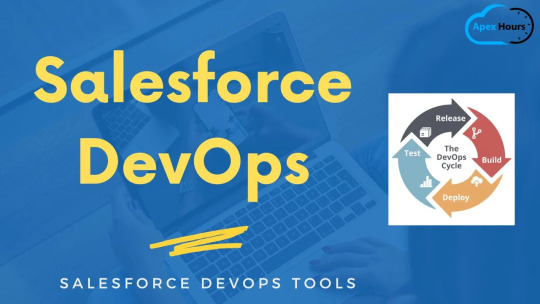#Salesforce devOps
Explore tagged Tumblr posts
Text
The Role of DevOps in Salesforce Implementation

DevOps Salesforce practices have revolutionized how organizations manage and deliver Salesforce solutions. By integrating development (Dev) and operations (Ops) teams, businesses can achieve seamless collaboration, faster deployments, and enhanced quality assurance in their Salesforce implementations.
Traditionally, Salesforce development faced challenges such as siloed teams, manual deployments, and inconsistent testing. DevOps Salesforce methodologies address these pain points by introducing automation, version control, and continuous integration/continuous delivery (CI/CD) pipelines. These tools and practices streamline the development lifecycle, reduce errors, and accelerate time-to-market.
One of the key benefits of DevOps Salesforce integration is improved agility. Organizations can respond to changing business requirements faster by deploying updates or new features efficiently. Additionally, automated testing ensures the stability and reliability of these changes, reducing the risk of breaking existing functionality.
DevOps Salesforce also promotes better collaboration across teams. Developers, administrators, and operations professionals can work together on a unified platform, ensuring transparency and alignment in their goals. This fosters a culture of accountability and continuous improvement.
Another advantage is scalability. As businesses grow, so do their Salesforce needs. DevOps Salesforce practices enable teams to handle increased complexity without compromising performance or quality. Tools like Git for version control and Jenkins for automation enhance efficiency, ensuring that even large-scale deployments run smoothly.In conclusion, integrating DevOps Salesforce practices is a game-changer for businesses aiming to optimize their Salesforce development and operations. It enables faster delivery, higher quality, and better collaboration, paving the way for long-term success. By adopting these practices, organizations can unlock the full potential of their Salesforce solutions and stay ahead in a competitive market.
0 notes
Text
Top 5 Salesforce DevOps Best Practices for Successful Deployment
Introduction:
As organizations continue to evolve, the need for faster and more reliable deployments has become critical. In the world of Salesforce, where customization and development are at the heart of business operations, ensuring that updates and changes are efficiently managed is key to staying competitive. This is where Salesforce DevOps comes into play, providing a framework for better collaboration, automation, and continuous delivery.
By following best practices in Salesforce DevOps, companies can avoid common pitfalls and achieve smoother, more successful deployments. In this article, we will explore the top 5 Salesforce DevOps best practices that will help you optimize your deployment processes and ensure your Salesforce services run smoothly.
1. Continuous Integration and Continuous Deployment (CI/CD)
What is CI/CD? CI/CD is at the core of any DevOps solution and involves automating the process of integrating code changes (Continuous Integration) and deploying those changes to production (Continuous Deployment). For Salesforce environments, this practice allows developers to merge code frequently, reducing the chances of conflicts and bugs down the line.
Why it Matters in Salesforce DevOps: In the Salesforce ecosystem, frequent code changes and updates can create challenges if not managed properly. CI/CD pipelines help ensure that every change is automatically tested and deployed, eliminating the manual processes that often delay releases. By setting up automated pipelines, you reduce the risk of errors and ensure that updates are delivered faster and more reliably.
Best Practice Tip: Use tools like Salesforce DX, Git, and Jenkins to set up an efficient CI/CD pipeline. Automate the testing and deployment process to minimize manual intervention and human error.
2. Version Control for Effective Change Management
What is Version Control? Version control allows developers to track changes to code, collaborate effectively, and maintain a history of modifications. For Salesforce DevOps, using a version control system (VCS) like Git is crucial for managing multiple teams working on the same Salesforce services simultaneously.
Why it Matters in Salesforce DevOps: Salesforce environments are often shared by multiple developers, admins, and teams, each contributing to different aspects of the platform. Without proper version control, changes can easily conflict with one another, leading to bugs or even system downtime. By implementing version control, you ensure that every change is tracked, making it easier to roll back if something goes wrong.
Best Practice Tip: Adopt a Git-based version control system and ensure all developers use it consistently. This will help track changes, avoid code conflicts, and maintain a clear history of updates.
3. Automated Testing for Quality Assurance
What is Automated Testing? Automated testing involves using scripts and testing frameworks to automatically validate that code behaves as expected. This is a crucial part of any DevOps solution and becomes even more important in a Salesforce environment where frequent updates and changes are common.
Why it Matters in Salesforce DevOps: Manual testing is time-consuming and error-prone. In Salesforce DevOps, automated testing ensures that every change made to your Salesforce services is tested immediately, reducing the chances of introducing bugs into the production environment. Automated tests help validate that new features work as intended and that existing functionality is not broken by the updates.
Best Practice Tip: Incorporate automated testing into your CI/CD pipeline. Use testing tools like Provar or Selenium to create comprehensive test suites that run automatically during every build and deployment process.
4. Monitoring and Feedback for Continuous Improvement
What is Monitoring and Feedback? Monitoring and feedback involve tracking the performance of your deployments and gathering input from users and systems to identify areas for improvement. In Salesforce DevOps, monitoring tools help you understand how deployments affect the performance and stability of your Salesforce services.
Why it Matters in Salesforce DevOps: Continuous monitoring ensures that any issues in your Salesforce environment are detected early, enabling faster resolution. Feedback loops between development, operations, and users allow teams to quickly address any shortcomings in their deployment processes or application performance. This leads to better outcomes and more reliable services.
Best Practice Tip: Use monitoring tools such as New Relic or Datadog to track the performance of your Salesforce environments. Set up alerts and dashboards to visualize key metrics and gather user feedback to continuously improve your DevOps process.
5. Governance and Security: Ensuring Compliance
What is Governance and Security? Governance refers to policies and procedures that ensure your Salesforce environment adheres to internal and external compliance standards. Security ensures that your Salesforce services are protected from vulnerabilities, especially when deploying changes through a DevOps solution.
Why it Matters in Salesforce DevOps: For industries like finance and healthcare, compliance with regulations (such as HIPAA or GDPR) is critical. Any changes made to your Salesforce environment must be compliant with these regulations to avoid penalties. Integrating governance and security checks into your DevOps pipeline ensures that every change is reviewed for compliance and security risks before being deployed.
Best Practice Tip: Implement governance and security checks into your DevOps pipeline by using tools like Copado or Gearset, which offer built-in compliance and security checks for Salesforce environments. Additionally, ensure that your development and operations teams are trained on security best practices.
Conclusion
Adopting Salesforce DevOps best practices is essential for ensuring successful deployments, faster time-to-market, and better collaboration across teams. From implementing CI/CD pipelines to incorporating automated testing, monitoring, and governance, these practices will help you optimize your Salesforce environment for speed, reliability, and security.
By following these top 5 Salesforce DevOps best practices, your organization can achieve smoother, more reliable deployments while enhancing the quality and performance of your Salesforce services.
0 notes
Text
Whether you want to disrupt your #healthcare #business or you want to automate your deployment tasks, #Salesforce DevOps is the answer! Discover how DevOps is transforming the healthcare sector through this infographic #Solunus https://www.solunus.com/post/5-benefits-of-adopting-salesforce-devops-for-healthcare-firms
0 notes
Text
SPARK TECHNOLOGIES
We deliver value by identifying opportunities that align with business objectives and adopting an agile approach to implement them.
#Web developement#Software testing#Devops & Engineering#Salesforce#Mobile Application Developmen#Data Analytics#IT Consulting#IT Outsourcing#Web Design#Content Management System#Digital Marketing
2 notes
·
View notes
Text
SPARK TECHNOLOGIES

We deliver value by identifying opportunities that align with business objectives and adopting an agile approach to implement them. We take full accountability for the IT and operation initiatives we propose and help you accomplish business goals faster. click here for more
#webdevelopement#softwaretesting#devops & engineering#salesforce#mobile application development#data analytics#it consulting#it outsourcing#web design#content management system#digital marketing
2 notes
·
View notes
Text


















🤝Hand holding support is available with 100% passing assurance🎯 📣Please let me know if you or any of your contacts need any certificate📣 📝or training to get better job opportunities or promotion in current job📝 📲𝗖𝗼𝗻𝘁𝗮𝗰𝘁 𝗨𝘀 : Interested people can whatsapp me directly ✅WhatsApp :- https://wa.aisensy.com/uemtSK 💯Proxy available with 100% passing guarantee.📌 🎀 FIRST PASS AND THAN PAY 🎀 ISC2 : CISSP & CCSP Cisco- CCNA, CCNP, Specialty ITILv4 CompTIA - All exams Google-Google Cloud Associate & Google Cloud Professional People Cert- ITILv4 PMI-PMP, PMI-ACP, PMI-PBA, PMI-CAPM, PMI-RMP, etc. EC Counsil-CEH,CHFI AWS- Associate, Professional, Specialty Juniper- Associate, Professional, Specialty Oracle - All exams Microsoft - All exams SAFe- All exams Scrum- All Exams Azure & many more… 📲𝗖𝗼𝗻𝘁𝗮𝗰𝘁 𝗨𝘀 : Interested people can whatsapp me directly ✅WhatsApp :- https://wa.aisensy.com/uemtSK
#ccna#ccnatraining#ccnacertification#cisco ccna#awscloud#aws course#devops#cybersecurity#salesforce#pmp certification#pmp training#pmp course#pmp exam
1 note
·
View note
Text
GetOnCRM’s Winning Formula at the 2025 Agentforce Hackathon
The focus at the 2025 Salesforce Agentforce Hackathon was on execution rather than just innovation. GetOnCRM’s Agentforce Hackathon solution stood out among the dozens of teams that built quickly and strategically because it not only delivered a brilliant idea but also a functional model that addressed actual internal workflow problems.
What was unique about GetOnCRM? It was clarity, not complexity.
Resolving the Issue No One Discusses
Slow internal support is a problem for the majority of enterprise teams. Ticket stall. Escalations are postponed. Valuable time slips away. GetOnCRM addressed the fundamental problem—internal service delays—and used intelligent Salesforce automation to resolve it rather than developing a new tracking tool.
Their remedy? A Slack-integrated support workflow created with Salesforce Flow Builder automation and connected through Salesforce Data Cloud integration. The agent could:
Quickly determine the urgency of the ticket
Pull background information from previous cases
Escalate to the appropriate channel in real time
You can accomplish this without ever leaving Slack.
This was not a theoretical demo—it was a functional prototype made for real enterprise support teams.
Integration in Real Time That Works
What made the solution even more impactful was its seamless connection to live enterprise data. With Salesforce Data Cloud, the agent worked off the latest information—not outdated snapshots—allowing it to make fast, accurate decisions without human intervention.
Thanks to agent memory and context awareness, the bot could deliver a personalized, intelligent support experience, reducing back-and-forth between staff.
The Tools That Powered the Win
GetOnCRM’s strategy was built on simplicity and real impact. These were the key ingredients:
Salesforce Agent Builder—the central control hub for the entire workflow
Slack-based Salesforce workflows—removing the need to juggle tools
Apex logic and Flow Builder—to automate smart, multi-step decisions
Cross-cloud Salesforce automation—linking operations, support, and collaboration platforms like Health Cloud, CPQ, and Revenue Cloud
Their approach resulted in a workflow that was not just smart but also scalable and enterprise-ready.
Built for Teams That Want to Move Faster
The goal wasn’t flashy tech—it was to remove friction from business processes. The hackathon confirmed what GetOnCRM’s Salesforce automation consulting services already strive for: real transformation using the right tools, fast.
This project wasn’t just a hackathon submission—it became a repeatable automation framework for intelligent support and operations.
✅ Want to learn how GetOnCRM uses Salesforce Agentforce to transform enterprise workflows?
Read the full case study on our Agentforce Hackathon success.
#Salesforce Agentforce#Agentforce Hackathon 2025#GetOnCRM Solutions#Salesforce Flow Builder#Slack based workflows#Salesforce Data Cloud#business process automation#enterprise automation tools#Salesforce automation consulting#AI powered workflows#internal support automation#DevOps automation Salesforce#Salesforce innovation#workflow optimization
0 notes
Text
What Is Salesforce DevOps Center? Features, Benefits & Best Practices – OpsNexa
Salesforce DevOps Center is a modern tool designed to simplify and streamline the development and release process on the Salesforce platform. What is DevOps Center in Salesforce? It brings together automation, version control, and continuous integration, enabling teams to manage changes more efficiently and deploy with confidence. Discover how DevOps Center supports better collaboration, visibility, and faster delivery in Salesforce environments.
#Salesforce DevOps Center#DevOps for Salesforce#Salesforce Deployment Tools#Salesforce Change Management
0 notes
Text
𝐒𝐚𝐥𝐞𝐬𝐟𝐨𝐫𝐜𝐞 𝐔𝐧𝐥𝐨𝐜𝐤𝐞𝐝 𝐏𝐚𝐜𝐤𝐚𝐠𝐞𝐬!
Say hello to 𝐒𝐚𝐥𝐞𝐬𝐟𝐨𝐫𝐜𝐞 𝐔𝐧𝐥𝐨𝐜𝐤𝐞𝐝 𝐏𝐚𝐜𝐤𝐚𝐠𝐞𝐬 – your key to faster deployments, modular code, and agile DevOps. Simplify version control and scale smarter with every release. Perfect for modern Salesforce teams!
✨👇 𝐂𝐥𝐢𝐜𝐤 𝐭𝐡𝐞 𝐜𝐨𝐦𝐦𝐞𝐧𝐭𝐬 𝐟𝐨𝐫 𝐦𝐨𝐫𝐞 𝐝𝐞𝐭𝐚𝐢𝐥𝐬! 👇✨

#Salesforce#UnlockedPackages#SFDX#SalesforceDev#DevOps#AgileCRM#TechInnovation#ModularCode#CloudSolutions#SalesforceLife
1 note
·
View note
Text
Innovative DevOps Approaches to Infrastructure as Code
In the evolving landscape of software development, Infrastructure as Code (IaC) has emerged as a transformative approach to managing and provisioning IT infrastructure. By treating infrastructure configurations as code, organizations can achieve consistency, scalability, and efficiency. This article explores innovative DevOps approaches to IaC, highlighting how Salesforce DevOps, including Salesforce DevOps tools and the Salesforce DevOps Center, can enhance IaC practices within the Salesforce ecosystem.
Understanding Infrastructure as Code
Infrastructure as Code is a DevOps practice that involves managing and provisioning computing resources through machine-readable definition files rather than physical hardware configuration or interactive configuration tools. IaC allows infrastructure to be versioned and treated as software code, enabling automation, consistency, and repeatability in infrastructure management.
Benefits of IaC in DevOps
Consistency and Reliability: IaC ensures that the same configuration is applied consistently across multiple environments, reducing the risk of configuration drift and manual errors.
Speed and Efficiency: Automated infrastructure provisioning speeds up the deployment process, allowing teams to spin up environments quickly and efficiently.
Scalability: IaC makes it easier to scale infrastructure up or down based on demand, ensuring optimal resource utilization.
Version Control: Treating infrastructure as code allows for versioning and rollback capabilities, making it easier to track changes and revert to previous configurations if needed.
Innovative DevOps Approaches to IaC
1. Modularization and Reusability
Modularization involves breaking down infrastructure code into reusable components or modules. This approach promotes code reuse and simplifies infrastructure management. For instance, creating modules for common infrastructure components such as virtual networks, storage accounts, and compute instances allows teams to reuse these modules across multiple projects. Tools like Terraform and AWS CloudFormation support modularization, enabling teams to build and maintain scalable and reusable infrastructure templates.
2. Policy as Code
Policy as Code is an innovative approach that integrates compliance and security policies into the IaC process. By defining policies as code, organizations can automate compliance checks and ensure that infrastructure adheres to security standards. Tools like HashiCorp Sentinel and Open Policy Agent (OPA) allow teams to enforce policies programmatically, ensuring that infrastructure deployments meet regulatory and security requirements.
3. GitOps
GitOps is a DevOps methodology that uses Git as a single source of truth for declarative infrastructure and applications. By storing IaC definitions in a Git repository, teams can leverage Git workflows for version control, collaboration, and automated deployments. When changes are committed to the repository, automation tools like ArgoCD or Flux can synchronize the desired state with the actual state of the infrastructure, ensuring consistency and reliability.
4. Automated Testing and Validation
Incorporating automated testing and validation into the IaC pipeline ensures that infrastructure code is thoroughly tested before deployment. Tools like Terraform Validate, AWS Config Rules, and Chef InSpec allow teams to write tests for infrastructure configurations, validating that they meet predefined criteria and standards. Automated testing reduces the risk of errors and ensures that infrastructure deployments are robust and reliable.
5. Immutable Infrastructure
Immutable infrastructure is an approach where infrastructure components are replaced rather than updated. This ensures that every deployment results in a fresh, clean environment, eliminating configuration drift and reducing the risk of inconsistencies. Immutable infrastructure can be achieved using containerization tools like Docker and orchestration platforms like Kubernetes, which facilitate the deployment of immutable containerized applications.
6. Integration with Salesforce DevOps
For organizations operating within the Salesforce ecosystem, integrating IaC practices with Salesforce DevOps can significantly enhance infrastructure management. Salesforce DevOps tools, including the Salesforce DevOps Center, provide capabilities for version control, automated testing, and continuous integration. By leveraging these tools, teams can manage Salesforce infrastructure as code, ensuring consistency, scalability, and efficiency.
7. Continuous Monitoring and Feedback
Implementing continuous monitoring and feedback mechanisms is crucial for maintaining the health and performance of infrastructure. Tools like Prometheus, Grafana, and Datadog offer real-time monitoring and alerting capabilities, enabling teams to detect and address issues proactively. Integrating these monitoring tools with IaC workflows ensures that infrastructure changes are continuously monitored, and any anomalies are promptly identified and resolved.
Conclusion
Innovative DevOps approaches to Infrastructure as Code are transforming the way organizations manage and provision their IT infrastructure. By adopting practices such as modularization, policy as code, GitOps, automated testing, immutable infrastructure, and continuous monitoring, teams can achieve consistency, scalability, and efficiency in their infrastructure management. Leveraging Salesforce DevOps tools and the Salesforce DevOps Center within the Salesforce ecosystem further enhances these capabilities, enabling seamless integration and management of Salesforce infrastructure as code. Embrace these innovative approaches to IaC to drive efficiency, reliability, and agility in your organization's infrastructure management.
0 notes
Text
https://www.wizwebitsolutions.com/tech-pulse/devops-automation-tools
0 notes
Text
Understanding DevOps in Salesforce: Benefits and Best Practices

DevOps Salesforce is a methodology that combines development and operations to streamline the software development lifecycle within the Salesforce ecosystem. By integrating automation, continuous integration/continuous deployment (CI/CD), and collaboration tools, DevOps Salesforce enhances productivity, reduces errors, and accelerates release cycles.
Why DevOps Salesforce is Essential
Traditional Salesforce development often relies on manual processes, leading to inefficiencies and deployment bottlenecks. DevOps Salesforce addresses these challenges by:
Automating Deployments: Reduces manual errors and speeds up releases.
Enhancing Collaboration: Developers, administrators, and business teams work together seamlessly.
Ensuring Code Quality: CI/CD pipelines help catch errors early.
Increasing Security: Automated testing and compliance checks strengthen data protection.
Improving Rollbacks: Version control allows easy recovery from failed deployments.
Best Practices for Implementing DevOps Salesforce
Use Version Control: Platforms like Git help track changes and ensure code consistency.
Adopt CI/CD Pipelines: Automate testing and deployments to minimize downtime.
Leverage Automation Tools: Use Salesforce DevOps tools like Gearset, Copado, or Flosum.
Monitor and Optimize: Regularly analyze performance metrics for continuous improvement.
Train Teams: Educate teams on best practices and tool usage to maximize efficiency.
Conclusion
Implementing DevOps Salesforce enhances development efficiency, improves deployment success rates, and ensures a seamless user experience. Businesses adopting DevOps Salesforce gain a competitive edge by delivering high-quality solutions faster and more reliably. Investing in the right tools and strategies will help organizations unlock the full potential of DevOps within their Salesforce environments.
0 notes
Text

VisualPath, a leading Salesforce CRM Training Institute in Hyderabad, offers expert-led Salesforce CRM Admin Training with hands-on experience. Our Salesforce CRM Online courses are available worldwide, including the USA, UK, Canada, Dubai, and Australia. Get the skills you need to excel in Salesforce CRM. Call +91-9989971070 to book your free demo session today!
Visit: https://www.visualpath.in/salesforce-crm-training.html
Blog : https://visualpathonlinetraininginstitute.blogspot.com/
whatsapp : https://www.whatsapp.com/catalog/919989971070/
#Salesforce#CRM#Admin#development#salesforcetraining#Visualpath#devops#salesforcedevops#salesforcecrmtraining#onlineclasses#trendingcourses#newtechnology#softwaretraining#crmplatform#operationalCRM#analyticalcrm#SAP#SalesforceSkills#CloudTechnology#salesforcecommunity#Crmadvantage
0 notes
Text
why to join salesforce training in hyderabad at cloud vision software training institute?
Joining Salesforce training at Cloud Vision Software Training Institute in Hyderabad can offer several benefits:
Comprehensive Curriculum: Cloud Vision is known for its well-structured and updated course material that covers everything from the basics to advanced Salesforce concepts, ensuring you get a thorough understanding.
Experienced Trainers: The trainers at Cloud Vision are typically experienced professionals with real-world expertise in Salesforce, providing insights into practical applications and industry trends.
Hands-on Training: The institute often emphasizes practical sessions, allowing you to work on real Salesforce applications, which is crucial for mastering the platform.
Certification Preparation: Cloud Vision provides support for Salesforce certification, helping you prepare for exams with practice tests, tips, and guidance to help you earn your certification.
Placement Assistance: Many institutes, including Cloud Vision, offer job placement assistance or connections to the industry, helping you transition smoothly into the workforce after completing the course.
Flexible Learning Options: Whether you're a working professional or a student, Cloud Vision may provide flexible class timings, including weekend batches, to accommodate your schedule.
Reputation and Reviews: Positive feedback and reviews from past students about the quality of training and overall experience can also influence your decision to join.
If you’re looking to enhance your skills in Salesforce, gaining hands-on experience, and boosting your employability in the cloud computing industry, Cloud Vision could be a solid option in Hyderabad.

#salesforce#salesforce training#aws devops#aws services#aws training#devops course in hyderabad#azure devops training in hyderabad
1 note
·
View note
Text
Streamlining Development with DevOps Salesforce

DevOps Salesforce is a powerful approach that blends the best practices of DevOps with Salesforce development, enabling businesses to achieve faster, more reliable deployments. By integrating DevOps principles with Salesforce, organizations can optimize development workflows, reduce manual errors, and deliver high-quality applications at a faster pace.
Salesforce's inherent flexibility makes it a top choice for businesses looking to customize solutions for their unique needs. However, managing its development lifecycle can be complex. This is where DevOps Salesforce tools and methodologies come into play. They facilitate version control, automated testing, and continuous integration/continuous deployment (CI/CD) pipelines. This ensures that changes are deployed smoothly while minimizing disruptions to production environments.
Key tools in the DevOps Salesforce ecosystem, such as Copado, Gearset, and AutoRABIT, simplify tasks like metadata management, automated backups, and deployment tracking. These tools empower teams to work collaboratively, even in multi-developer environments, by providing visibility and control over changes in real-time.
Adopting DevOps Salesforce also enhances agility, a critical factor for businesses operating in dynamic markets. With shorter development cycles and automated testing, teams can respond quickly to user feedback and roll out updates with minimal downtime. This is especially beneficial for companies relying on Salesforce as their CRM platform to maintain seamless customer experiences.
In conclusion, DevOps Salesforce bridges the gap between development and operations teams, creating a cohesive environment for delivering scalable, reliable solutions. Whether you are scaling your Salesforce applications or streamlining workflows, embracing DevOps Salesforce methodologies is a smart move for sustained growth and innovation.By implementing DevOps Salesforce best practices, companies can unlock the full potential of their Salesforce ecosystem, ensuring competitive advantage and operational efficiency in today’s fast-paced digital landscape.
0 notes